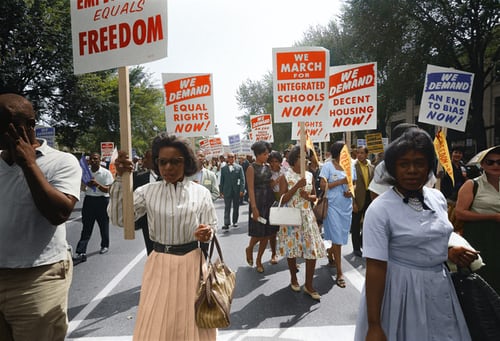The Forgotten Pioneers Of Civil Rights In America
Many people know the Reverend Dr. Martin Luther King, they also know Rosa Parks. But these people are only the tip of the iceberg when it comes to organizing, protesting, and the fight for civil rights in America.
Have you been poking around in your history books and are having trouble identifying photographs of possible civil rights leaders? Are you interested in the cause of civil rights and want to know who was involved in the hard-fought gains in civil liberties? Here’s a shortlist of some inspiring people who were the unsung heroes of the fight for civil rights.
W.E.B. DuBois
W.E.B. DuBois was the first African-American man to receive a Ph.D. from Harvard University. He was a scholar and a historian who wrote The Souls Of Black Folk. He was also one of the founders of the Nationals Association for the Advancement of Colored People, otherwise known as the NAACP, in 1909. To this day, this organization supports the civil rights movements and fights racism wherever it crops up.
Septima Poinsette Clark
Septima Poinsette Clark was a teacher from Charleston, South Carolina. Poinsette Clark taught in a rural school on Johns Island because Charleston discriminated against black folk. In her spare time, she taught adults to read.
She was an active member of the NAACP and was fired for her activism, but she never gave up being an educator. She even set up workshops to encourage voter registration and literacy in the black community. She is credited as the Mother (some even say Queen Mother) of the American Civil Rights Movement. She was also given the Living Legacy Award by President Jimmy Carter in 1979.
Claudette Colvin
Before there was Rosa Parks, there was Claudette Colvin. She was a schoolgirl in the 1950s who refused to give up her seat to a white lady, although she did not get famous for doing so. However, she was instrumental in inspiring the now-historical boycott, as her act of defiance is what led the secretary of the NAACP in Montgomery – a woman named Rosa Parks – to do the same thing as part of a larger organized bus boycott a few months later.
Thurgood Marshall
Thurgood Marshall was a lawyer and a civil rights leader who joined the NAACP in 1936 and was later named Chief Counsel of the organization. Over three decades, Marshall fought for equal pay for black teachers and the end of segregation in schools, neighborhoods, and juries; and more – likely a somewhat personal cause, as Marshall himself was denied admission to the all-white University of Maryland Law School.
In 1954, Marshall argued and won the historic Brown vs the Board of Education before the Supreme Court, a case that ended legal segregation in schools. He was also the first man of African-American descent to serve as a justice of the Supreme Court.
Medgar Evers
Medgar Evers was drafted into the army in 1943, which eventually led him to France. There, he saw black people staying in the foreign country where they were treated as equals, rather than returning to the segregated USA.
When he came back from his time abroad, he became the first state field secretary of the NAACP in Mississippi. Evers led boycotts and voter registration campaigns. He fought injustice wherever he found it, especially in the case of 14-year-old Emmett Till who was murdered for whistling at a white woman. Medgar Evers was unfortunately assassinated by racists in 1963.
Ruby Bridges
Ruby Bridges was the first little girl to integrate the all-white William Frantz Elementary School in Louisiana at the young age of six. She was yelled and jeered at, and had to be escorted by the Federal Marshalls. Despite all the harassment, she never missed a day of school. Ruby eventually grew up to become an activist for equality.
Fannie Lou Hamer
Fannie Lou Hamer experienced crippling poverty and horrendous racism. In 1962, she tried to vote for the first time…and was fired from her sharecropping job and kicked out of her rented home for doing so.
Nevertheless, she fought for black people’s right to vote. She founded the Mississippi Freedom Democratic Party, an organization to promote black voting. She also helped organize Freedom Summer, a movement that brought together black and white people to register new voters. She was also one of the founders of the National Women’s Political Caucus.
Closing Thoughts
Behind every face of the civil rights movement, there are dozens of people working in the background to organize and make sure that the fight goes on. The above pioneers navigated politics and optics, working within or establishing organizations that advance the cause of racial equality in the USA. Even though they may not be the most famous civil rights leaders, their names should never be forgotten.

